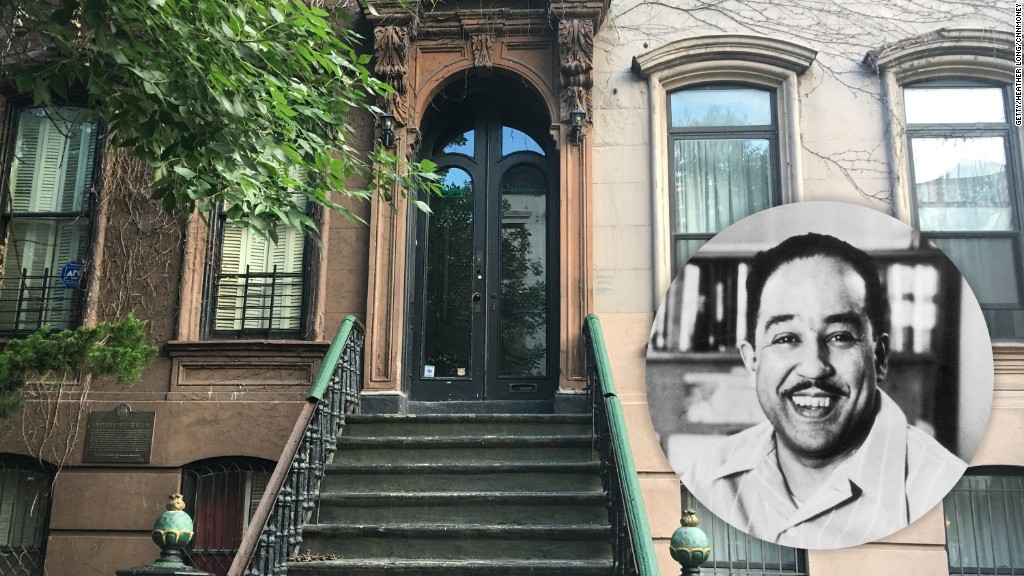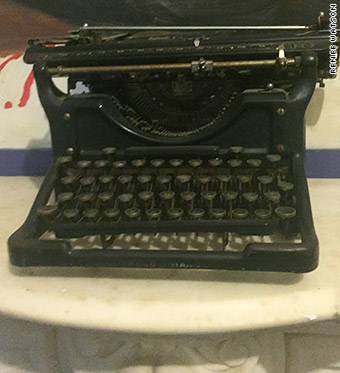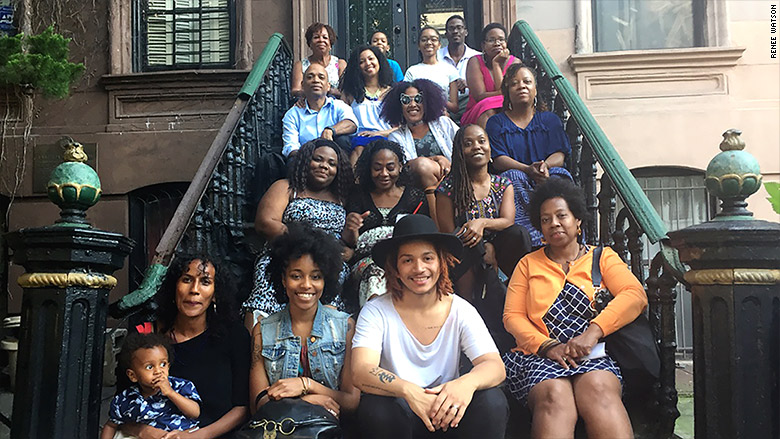
Ivy still grows on the front of Langston Hughes' home in Harlem. There aren't many houses like it left in New York City. Real estate agents estimate it's worth over $3 million.
And that's before anyone talks about the fact that one of America's great writers -- a hero of the Harlem Renaissance -- lived there for much of the 1950s and 60s, until he passed away. His typerwriter is still on a shelf.
Pressure to sell "Hughes House" is escalating. The current owner listed it for a mere $1 million a few years ago, but it didn't sell. For now, the home sits empty. The owner doesn't live there. No one does. Paint is chipping off the front steps.
Renee Watson thinks it's a tragedy. That's why she started an Indiegogo campaign to raise $150,000 to rent the home and turn it into a cultural center honoring Hughes.
"The more Harlem changes, the more I'm motivated to do something," says Watson, a writer who lives nearby, and has watched gentrification flood in. A Whole Foods is set to open in the area early next year. Realtors predict prices will skyrocket even further.
"We -- the community -- must hold on to the space," says Watson. "I feel a sense of urgency."
So far, the initiative to save Hughes House has raised just over $25,000.
Related: Playboy Mansion sold for $100 million
'Nothing is sacred' in New York City
Watson remembers memorizing Hughes' poem "I, too, sing America" in 3rd grade in Portland, Oregon. As a young black artist, she felt that Hughes was holding up a mirror to her soul.
Just over a decade ago, Watson moved to New York City. One of her first pilgrimages was to East Harlem to find Hughes' house at 20 E. 127th Street. She was shocked to find it eerily quiet. There was no museum, no cultural center, just a small plaque that's hard to read from the sidewalk.
When the New York Times dubbed East Harlem the last "good deal" in Manhattan earlier this year, Watson knew she had to act. She reached out to the owner and pleaded.

"If someone made [the owner] an offer, she would definitely sell it, but like me, she doesn't want it to become condos or a coffee shop," says Watson. (The owner declined to speak with CNNMoney. Real estate records show she has held the deed to the home since 1999).
Watson sent out the "bat signal" to other authors in her network to ask for donations and support. Over 250 people have given money already.
Young adult author Jason Reynolds signed up immediately. He remembers when the house was for sale a few years ago. He never wants to see that again.
"I kept thinking, this is just like New York, nothing is sacred," Reynolds told CNNMoney.
Related: 'I like money': Meet the new women of Wall St.
Can they raise the money in time?
Reynolds is one of many authors, especially in the African-American community, who dream of doing a reading there. The plan is to turn the main parlor into a space for events and use the upstairs rooms as places for artists to work or for classes.
The current owner has agreed to hold off on selling to see how the project unfolds.
"Hughes is deeply influential and important not only to me, but many writers of color," says author Jacqueline Woodson, who is also involved in the initiative. Her book "Brown Girl Dreaming" won the National Book Award. It opens with a Hughes poem.

Related: Broadway hit 'Hamilton' has good life advice
The great fear is that the funds to rent and restore the home won't be raised in time. The neighborhood is gentrifying...fast. There are signs of money everywhere: Old brownstone homes are being gutted or knocked down completely to make way for modern apartment buildings.
Marsha, a long-time resident of the block, told CNNMoney that middle class African-Americans began to move back into East Harlem in the early 2000s. But "we didn't get the amenities."
Hughes himself once wrote, "Misery is when you heard on the radio that the neighborhood you live in is a slum but you always thought it was home."
Now white families are increasingly moving in and so are big chain stores and restaurants. In 2013, actor Neil Patrick Harris paid $3.6 million for a property not far from Hughes House.
"Once the Starbucks came, you knew the neighborhood had completely changed," says realtor Jen Lee of BLU Realty Group. "Everybody's expecting property values to go shooting up again in Harlem."


